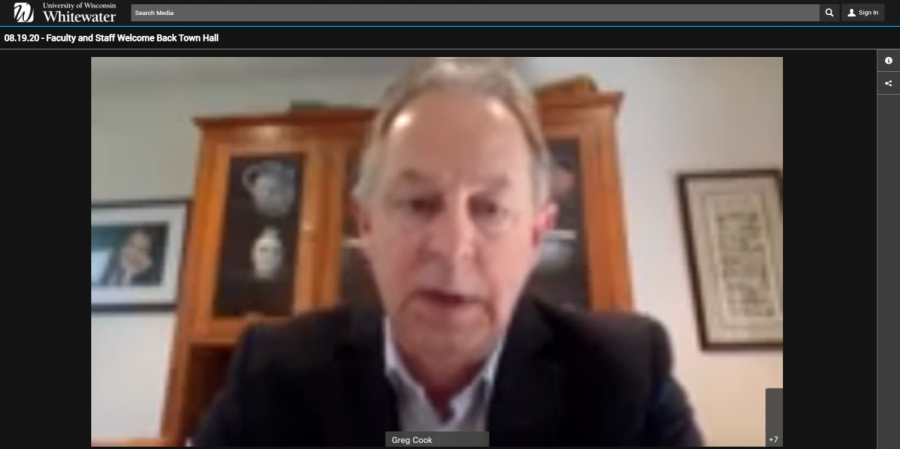Fall Forum presents budget and new undergrad cybersecurity program
August 30, 2020
Interim Provost Greg Cook and a panel of speakers presented an online Fall Forum Tuesday, Aug. 25 for faculty and staff featuring an analysis of the university budget and a presentation about the new cybersecurity undergraduate program.
“At UW-Whitewater, we’ve involved great minds across the whole university to design new and improved strategies to attract and enroll students,” said Cook.
The COVID-19 pandemic had brought an unexpected revenue loss of $10.6 million at the end of the prior fiscal year, but the Coronavirus Aid Relieve and Economic Security (CARES) Act, state relief funding and other resources are helping to balance those losses. Other challenges include an expected $2.6 million state funding reduction and about $3 million in less tuition for the 2021 fiscal year.
Freshman class enrollment has stabilized and the university is graduating large classes of students. The resulting overall reduction of the student body is not unique to UW-Whitewater, according to Cook. Enrollment is falling at four-year universities around the country, partly due to a growing popularity in technical and two-year colleges. Still, Cook remains confident about UW-Whitewater’s ability to retain numbers.
“This year, we were one of only six out of 13 UW institutions to have more admissions applications this year than last year. We are also graduating more students in four years or within six years than ever before. I’m very confident that our enrollment will remain strong.”
Important budget resources are offsetting the lower tuition dollars such as $3.95 million in employee furlough savings, an 80 percent reduction in university travel and other cost savings. Cook believes investment in new programs like cybersecurity will attract more students to UW-Whitewater.
The university already offers both a certificate and a graduate program in cybersecurity, but the option of obtaining a bachelor’s degree will open further opportunities for students looking to pursue a career in the field.
“The program will complete a concrete pathway in cybersecurity education for Wisconsin residents,” said information technology and business education professor Roger Yin.
Two hundred students are expected to enroll in the Cybersecurity B.S. program within five years of the program’s launch. As the numbers grow, director of the Cybersecurity Center for Business (CCB) Brian Dennis is confident UW-Whitewater will play a vital role in adding thoroughly-trained cybersecurity employees to the workforce.
“When we brought the center in 2019, we really started thinking about what new opportunities are out there. What we want to do is make UW-Whitewater recognized nationally as a leader in cybersecurity education,” said Dennis.
Just off the cusp of two generous apprenticeship grants to the CCB early in 2020 came another grant in August for $450,000. This one was awarded by Acuity Insurance for the creation of a Cyber Range at UW-Whitewater.
“A Cyber Range is a quarantined network that puts participants into live-fire situations. It will be used for the testing of new systems, assessment of existing systems, training on network security, and live scrimmage,” said director of business outreach Kevin Kaufman. “Students will get a one of a kind experience.”
The Fall Forum offered many important campus updates and insight into ongoing developments. Even with the uncertainty of the months to come with classes going remote after Nov. 20, university leadership are steadfast in their commitment to UW-Whitewater’s success.













